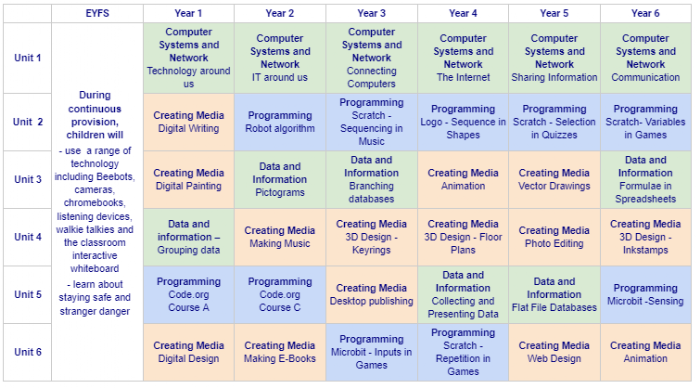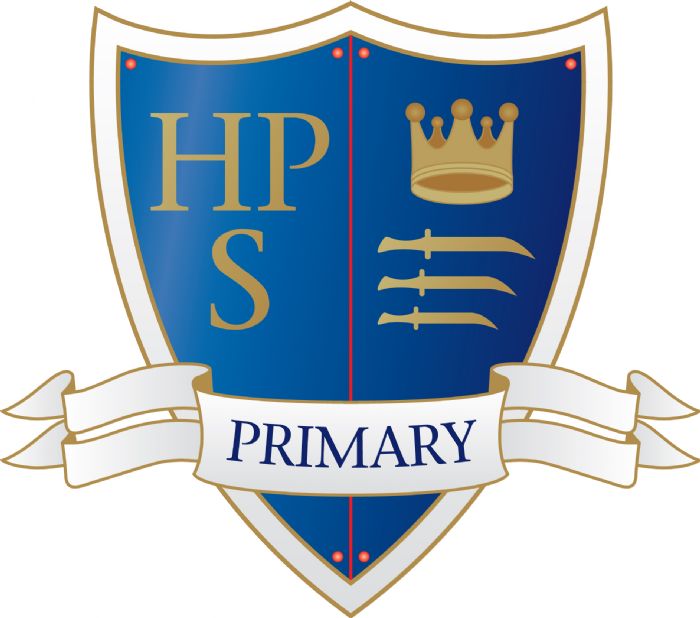Computing
Subject Leader:
A team of teachers with particular responsibility for computing.
Intention:
Computing at Hillingdon Primary School is valued as a discrete subject that we often link to other subjects to create a context and purpose when learning. It is taught in unit blocks and with the following intention:
- To provide a broad, balanced, challenging and enjoyable curriculum for all pupils.
- To develop pupil’s computational thinking skills that will benefit them throughout their lives.
- To meet the requirements of the national curriculum programmes of study for computing at Key Stage 1 and 2.
- To respond to new developments in technology.
- To equip pupils with the confidence and skills to use digital tools and technologies throughout their lives.
- To enhance and enrich learning in other areas of the curriculum using information technology and computing.
- To develop the understanding of how to use computers and digital tools safely and responsibly.
In addition, information technology, computer science and digital literacy are used to enhance pupils’ learning in other subjects. We recognise that they have particular links with mathematics, science and design technology and we build on these links when appropriate, providing access to a rich and varied source of information and content.
We recognise how technology supports study skills through quick and efficient access to large amounts of information in a variety of formats. How it can motivate and enthuse pupils and offers opportunities for communication and collaboration through groups working both inside and outside of school. How it has the flexibility to meet the individual needs and abilities of each pupil.
We also recognise the value pupils place on digital literacy, its links with social media and the essential life skills needed to fully participate in the modern digital world. It is important for us to teach our pupils to be able to use the power of technology positively to become creators of digital content rather than simply consumers of it, to keep themselves safe, to express themselves and develop their ideas as active and safe participants in a digital world, for pleasure and for possible future employment. We value our partnership with parents/carers in encouraging the safe use of technology through our computing and personal development curricula and individual support via our pastoral support team when needed and in partnership with parents / carers.
Computing Long Term Plan:

National Curriculum:
The National Curriculum for Computing aims to ensure that all pupils:
- can understand and apply the fundamental principles of computer science, including logic, algorithms, data representation, and communication;
- can analyse problems in computational terms, and have repeated practical experience of writing computer programs in order to solve such problems;
- can evaluate and apply information technology, including new or unfamiliar technologies, analytically to solve problems;
- are responsible, competent, confident and creative users of information and communication technology.
Early years:
It is important in the foundation stage to give children a broad, play-based experience of information technology and computing in a range of contexts, including off-computer activities and outdoor play.
Computing is not just about computers. Early years learning environments should feature information technology scenarios based on experience in the real world, such as in role play. Children gain confidence, control and language skills through opportunities such as ‘programming’ each other using directional language to find toys/objects, creating artwork using digital drawing tools and controlling programmable toys.
Outdoor exploration is an important aspect and using digital recording devices such as video recorders, cameras and microphones can support children in developing communication skills. This is particularly beneficial for children who have English as an additional language.
By the end of key stage 1 pupils should be taught to:
- Understand what algorithms are; how they are implemented as programs on digital devices; and that programs execute by following precise and unambiguous instructions.
- Create and debug simple programs.
- Use logical reasoning to predict the behaviour of simple programs.
- Use technology purposefully to create, organise, store, manipulate and retrieve digital content.
- Recognise common uses of information technology beyond school.
- Use technology safely and respectfully, keeping personal information private; identify where to go for help and support when they have concerns about content or contact on the internet or other online technologies.
By the end of key stage 2 pupils should be taught to:
- Design, write and debug programs that accomplish specific goals, including controlling or simulating physical systems; solve problems by decomposing them into smaller parts.
- Use sequence, selection, and repetition in programs; work with variables and various forms of input and output.
- Use logical reasoning to explain how some simple algorithms work and to detect and correct errors in algorithms and programs.
- Understand computer networks including the internet; how they can provide multiple services, such as the world wide web; and the opportunities they offer for communication and collaboration.
- Use search technologies effectively, appreciate how results are selected and ranked, and be discerning in evaluating digital content.
- Select, use and combine a variety of software (including internet services) on a range of digital devices to design and create a range of programs, systems and content that accomplish given goals, including collecting, analysing, evaluating and presenting data and information.
- Use technology safely, respectfully and responsibly; recognise acceptable/unacceptable behaviour; identify a range of ways to report concerns about content and contact.
